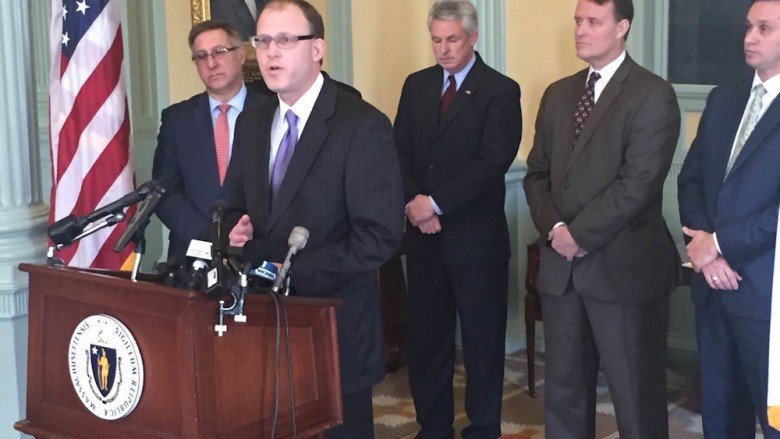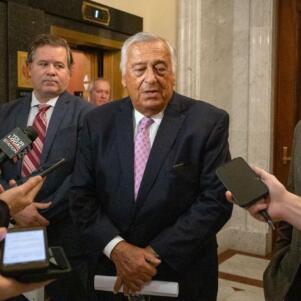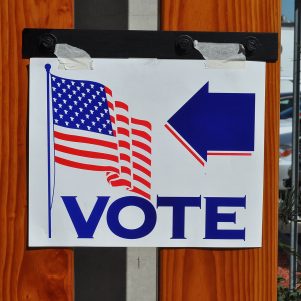Pot initiative poses risks, no tax gain, Senate group says
By State House News Service | March 8, 2016, 20:14 EST
 Sen. Jason Lewis, at podium, flanked by members of the special committee that produced a report on legalizing marijuana retail sales, speaks to reporters about the issue Tuesday in the State House. (State House News Service photo by Antonio Caban)
Sen. Jason Lewis, at podium, flanked by members of the special committee that produced a report on legalizing marijuana retail sales, speaks to reporters about the issue Tuesday in the State House. (State House News Service photo by Antonio Caban) BOSTON – A group of state lawmakers outlined an approach to marijuana legalization Tuesday that would involve the Legislature tinkering with a voter-approved ballot initiative to a far greater degree than has been customary in order to address “serious concerns” it has with the prospect of full legalization.
In anticipation of voters deciding whether to legalize the adult use and commercial sale of marijuana in November, the Special Senate Committee on Marijuana on Tuesday released a report – the culmination of a year of research, they said – stocked with warnings about legalization and laying out recommended alterations to the ballot initiative language, if it is approved by voters.
“The bottom line is that legalizing marijuana is far more complex than a simple yes or no question,” Sen. Jason Lewis, chairman of the special committee, said. “And although a ballot initiative doesn’t lend itself to all of that complexity, you have to say yes or no, what we hope, partially through the work that we’ve done and this report, is that residents of the state will start to understand the complexity of the issue.”
Among the concerns raised by the committee are the impacts legalization would have on children and teens, the ability of law enforcement officers to discern when a driver is under the influence of marijuana, the changes in the black market that would be spurred by legalization, and the mechanics of cultivating a new industry that remains illegal at the federal level.
A ballot initiative supported by the Campaign to Regulate Marijuana Like Alcohol would legalize the adult use of marijuana and make it available through a regulated retail industry. The ballot initiative would impose a 3.75 percent state excise tax on retail marijuana sales, allow adults 21 and older to possess up to an ounce of marijuana in public and establish a Cannabis Control Commission to oversee the new industry.
When a significant change in law appears destined to go to voters, the Legislature has sometimes sought to avoid a messy ballot question battle by instead drafting its own legislation to effectuate the change on terms lawmakers agree upon.
This year, however, there is little support for taking up a marijuana legalization bill on Beacon Hill, and members of the Senate committee on Tuesday acknowledged that the Legislature is likely to forgo its chance to legalize the drug on its own terms and instead opt to weigh in after voters.
In recent years, lawmakers have been reluctant to tinker with ballot question language approved by voters, arguing that the will of the voters was made clear on Election Day. But the report Tuesday details dozens of “recommended actions” the Legislature could take to tailor the ballot question language if it is approved.
“If that is the decision of the voters in November to approve the ballot question and move forward, I have no doubt that the Legislature will respect the will of the voters,” Lewis said. “At the same time, when somebody is voting in November, assuming this is on the ballot, I doubt that they will be thinking about … whether you should be allowed to grow six plants at home, or 12 plants or no plants, and I doubt they’ll be thinking about whether the tax rate should be 3.75 percent, or whether it should be an excise tax versus a sales tax.”
After the release of the Senate committee report, the campaign behind the ballot initiative blasted the committee as “legislators who have abdicated their responsibility to legislate.”
“Up until late last year, this was a one-person committee. They hastily put together a group of people, they hastily convened a trip to Colorado and within weeks they hastily put out a report,” Jim Borghesani, communications director of the Campaign to Regulate Marijuana Like Alcohol, told reporters. “This is not a deep dive, this is a very shallow dive.”
The Senate committee’s recommendations, if adopted, would significantly alter the current ballot initiative language.
Whereas the initiative calls for a 3.75 percent state excise tax on retail marijuana sales on top of the state’s 6.25 percent sales tax, the Senate committee recommends an excise tax of 5 percent to 15 percent to be collected from growers, a marijuana-specific sales tax of 10 percent to 20 percent and allowing municipalities to enact an additional 5 percent local sales tax.
The higher tax rates, Lewis said, would be necessary in order to cover the all the costs associated with implementation of the law and to deal with the impacts of legalization.
“Based upon the size of the market, half a billion dollars, we estimate the tax revenues and the license revenues in the $50 to $60 million range on an annual basis,” he said. “We think that may not even be sufficient to cover the full gamut of public and social costs that we would incur.”
The Senate committee also recommends prohibiting, or at least placing a temporary moratorium on, home cultivation of marijuana. Under the ballot initiative language, adults would be able to grow as many as six mature plants and 12 seedlings in their homes for personal use.
Marijuana advocates have had marked success taking marijuana reform efforts directly to the voters. Possession of less than an ounce of pot was decriminalized by voters in 2008 and four years later voters handily approved the medical use of marijuana. But those votes, Lewis said, pale in comparison to the one that could be on the November ballot.
“The question that we’re now considering and will be before voters in November is vastly different and vastly more complicated and more challenging and has far greater ramifications for the health and safety and quality of life, economic issues for the state than was the case with decriminalization in 2008 or medical marijuana in 2012,” he said.
Written by Colin A. Young











